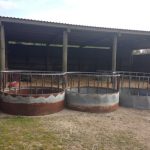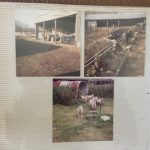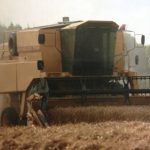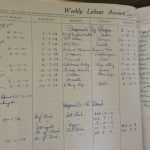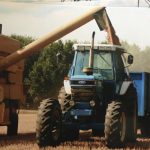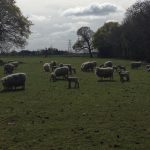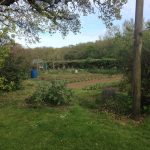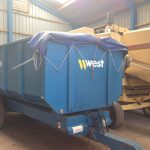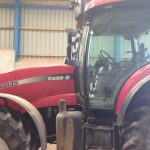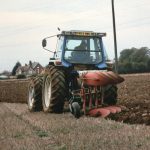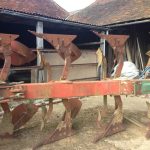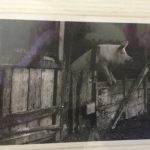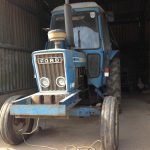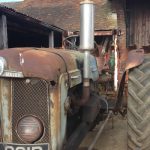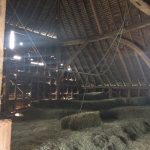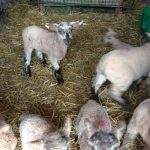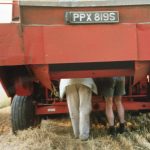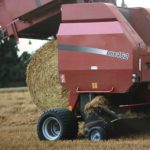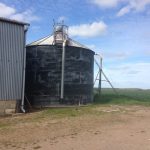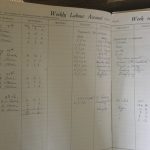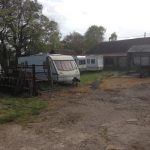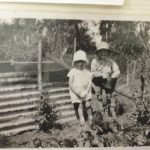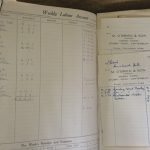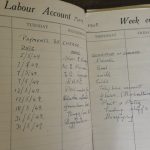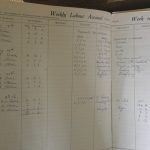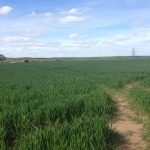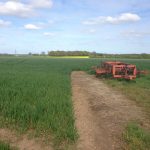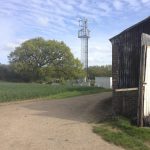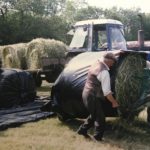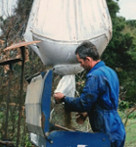
Ross O’Brien
About
| Farmer’s name | Ross O’Brien |
| Age | 88 |
| Location | Hawcroft Farm, Canterbury |
| Size | 320 acres |
| Type | Arable/Beef |
Interviewed by: Louise Rasmussen
Date: 24 April 2015
Transcript
Ross: Yeah, so I will start with the…a little bit about my parents, I am now, my age is, I was born in 1927, so that makes me 88 this month, I’m 88 this month, yeah. I’m one of 3 children; my brother was born 2 years before me in 1925, and my sister was born 11 years after me, quite a long time actually, in 1938, a year before the war started. So I went to the local primary school, a Methodist primary school actually, and then onto the Simon Langton Grammar School, you’ve probably heard of it, it’s a local one. Anyway, I left school at 15 ½, 16 and came to work on the farm with my father, who had a small holding of about 29, 30 acres called Marsh Farm, 2 miles from the centre of the city, on the outskirts of Canterbury. And his main farming things were, he had about 200 pigs, this is back in pre-war days, well, now I came out of school in 1943 I think it was, half way through the war, so he, and, to work on the farm, he had 200 pigs, which was his main industry, he had a little bit of a nursery, he had 2 horses actually; one horse, and at this time he had the contract for collecting all the kitchen waste from the local barracks. Which was the Canterbury Berets it’s finished now, so he would collect daily, and he had that contract from 1925 until 1974, until the barracks virtually closed. The first, now…perhaps it was a bit later than that, in the 80s, when we had an attack of foot and mouth and they stopped us using kitchen waste. Did you know that? They stopped them. We used to steam it, and feed it, you know. They probably do it in Holland, in Denmark, is it? They probably do it a lot over there, or did. So that was his main farming activity, keeping pigs. He employed one man, and when I left school, myself. So I worked, in those days I worked for three or four years, and then I was called up before the war ended into the air force. We were still only had our 30 acres with the pigs, and the little bit of market garden. We grew tomatoes, and we had a green house, we grew and this was all during the war. So he, just after the war, I was caught up in 1940…, just before the war ended in 1945, and I served just under 2 years in the air force and came out on so called B release. I was in Palestine then, I was, I’d been posted to Palestine just after the war and did a stint out there, and my B release came through which was for the all miners and farmworkers, they wanted them home to do, to help grow food and dig coal, and that sort of thing. So I was only 19, 20 then, and it was rather shame, because I went in as aircrew because I was an ATC boy, and studied all the navigation Morse code, but it was towards the end of the war when I went in so they didn’t need anymore aircrew, so I had to do something else. And I took a fitter, not an aircraft fitter, an MT fitter, which I thought would be, which it was, it was quite useful for me as a farmer, you see. So I did a course, and as I was posted to Palestine, and they flew us out in a liberator bomber, you know, just after the war. 9 of us, 9 they were all MT fitters, we served in Palestine, came home, de-mobbed, and then we thought we’d try and expand. We took over another 20 acres adjacent to us, and we grew even more market garden crops: potatoes, and cauliflower, lots of cauliflower, we bought a new tractor. Before that, father had his 2 horses and then in the war we bought a very old standard Fordson – one of the old fashioned ones – but then after the war when I came home, we bought, for me this was actually, bought me a, he bought a 3 ton lorry, which he used to collect his kitchen waste instead of his horse and cart. You see. And the tractor, and the first post war Fordson major tractor, so I was working full time then, and I did a little bit of contract work as well, because I had a plough and a new tractor, so that happened, and then in 1952, I got married. I got married, yes. … If you look at that picture there, there’s my wife in the middle there, that’s my brother on there, that was taken, my 80.., I think it was 7 or 8 years ago. Anyway, we got married, so we expanded, we did, we rented this other land across the road, I think another 20 acres. So then we were farming 50 or 60 acres. So then in that, that was 1952, and then in 1957, we expanded again, and we bought this farm here; Hawcroft farm. Which is, which then was 70 acres. 70 acres. And we had cattle, although we had a few sheep, even at Marsh farm, so then we had sheep, cattle, pigs, chickens, we had everything really. We were generally a mixed farm. That was 1957, so then we were farming a 120 acres I think, or no, a bit more than that, about 130 acres, 130 acres. That was in 1957. He still had his contract with the army, so we were still keeping pigs, we built a deep lettuce shed and kept chickens. I had 400 hens, which we sold to the local egg merchants, and my wife looked after the chickens. We sold a lot locally, from the door. I was still living on the house of the original farm, Marsh farm, the 30 acres, and when we got married, my father moved and bought a house in Sturry. So we lived in Marsh farm. It was pretty primitive because prior to us being married, the toilet was a bucket in the end of the garden, you know, back in those days… no bathroom, so as soon as we were married my father said well, we ought to make you modernize this house, although he’d been living there, so we had a bathroom put on and a cesspool and a toilet, which rather pleased my wife. She came from a house where they had flushing toilets and bathrooms to my house with no toilet, no bathroom, tin bath to wash with, you know, this was way back, 1952. So we lived there in Marsh farm in that particular house until 1974, so that’s 22 years, no more than that isn’t it, 40, 52 to 74 what is that? It is 20 odd years, isn’t it? And then, that’s it. And then the council put a compulsory purchase on the land, which we had to extend the playing fields within the city. So we had to sell that, otherwise they would have taken it, and it only left us with 10 acres down there. This was in 1974 this happened. So in the meantime, father, we pulled the house…let me go back; 1957 we came up here, I was living in Marsh farm, father was living in Sturry…So in 1974, 1957 we pulled, when we bought this, we pulled the old house down, which was pretty old, they wouldn’t allow you to do it today because of the restrictions and the age of it, but in those days you could pull it down. It was a big old farmhouse, 1600 I think, but it was full of deathwatch beetle and wireworm, woodworm so we pulled it down. And this was built in its place. In 1957 so my father moved out the house he had in Sturry into this one, and he remained here at Hawcroft farmhouse until 1974 when we were compulsory purchased at Marsh farm, and I had to get out. So we came up here, and he moved to a bungalow in the village. He’d retired then anyway, so that’s it. So we go back to the farming then, so 1974 we came up here, we employed 2 men then, one, yes 2 men. Sid, who was with my father, had been with us, when he finished he’d been with us for 50 years actually. And he looked after the pigs mainly and did the manual work, he wasn’t a great tractor man, and David who we took over with the farm when we bought it was the tractor driver. So we grew wheat and barley. Barley was to feed the cattle, and to feed the pigs. The eggs and chickens my wife took over those completely and she sold eggs at the door here and potatoes, and then in 1980 my son finished, David whom you met, finished college I think, he’d been to Harper Adams, have you heard of Harper Adams? It’s an agriculture college up in Shropshire. When he left college, he went for 6 months to Denmark, that’s how he… Did he tell you he’d been?
L: Yes, just a little bit.
R: Did you know where he was?
L: No, he didn’t tell me yet.
R: He’ll tell you later then. In fact, he went back last year for a holiday there. With the farmer who he stayed with, or the farmer’s son, I think. So then, he came home, so then we expanded a bit more: I rented more land, which we rented Blackslands farm, which is part of the new reservoir land where they are going to build a reservoir, and they, we rented a 100 acres there, we also bought 40 acres free hold land two miles away. So then we were farming with all the land, and that we rented and what we had, we were farming 300 acres I suppose. So then David came home, one chap had died, and Sid retired as David came home. So that left just David and I, so we farmed it all between us with a little bit of contract work I did most of the ploughing. I still do ploughing, I did a lot of the ploughing last year. Let me see… What else can I say? So now we sold the chickens, it was getting a bit too much for us, especially for me, and two years ago we sold the cattle. We used to keep cattle, we used to buy in calves and fatten them off until they were beef, you know. We’d only buy steers or male calves and fatten them for 18 months or two years and sell them. We would fatten off 25 a year I think. We’d buy 25 each year, so one time we’d have 50 cattle on the farm. We had about 60 ewes in use, 400 chickens when we were really going. In the last few years we’ve cut back on lots of those things, and now all we have now, we grow all the cereals, we grow rye for Ryvita, we have a contract with Ryvita. Have you heard of Ryvita? Shocking stuff isn’t it?… So we’ve got rid of all the cattle, all the chickens, the pigs had gone, so all we have now are 300 acres of arable and pasture, and cereal crops we sometimes we grow, we got rid of the spuds, we don’t grow potatoes now. … Things have changed an awful lot you know. Labour’s the expensive thing now, and that’s why there’s just the two of us, and I’m not doing so much now so we are now having, some of the work we have a contractor in to do the bits an pieces, you know, to cut the hedges and to bail up some of the grass, you know for hay or silage. What else can I tell you? I lost my wife 2 years ago, or nearly, I’ve been on my own 2 years. She had a stroke two years ago.
L: I’m sorry to hear.
R: Yeah. So I’ve seen a lot of changes. When I was first, I’ve got…I’ll just give you some idea of how much we earned in those days, or how much I earned. I did get some books out here, but I can’t remember which ones they are. I’ve got a lot of old photographs here as well. (Takes out the photos…) So 1949, I would have come out the air force then in 1946. There we are, my brother, who also went in the air force and came back home. (Looking through the pages…) Wages! 1949, that’s the chap that worked for us here, 4 pounds 15 and a penny. I earned 2 pounds 7 and 6 … and he earned the same. Payments by cheque 1949, I don’t know what…That swill, that’s…we had to pay for all this kitchen waste, 16 and 6. The royal army pay corps another regiment, these were all stationed in Canterbury. 19 and 9 pence! Glass, that was to repair our green house, I remember doing that, 15 pounds paint and putty. Feeding stuff: Kingsfords, 46 pounds 18 and 5. Payments to bank: Ministry of food: all the pigs then those days were bought by the Ministry. They were fat pigs 1.95, I don’t know how many pigs there were, and a 1.20, two lots of pigs, there would probably have been 20 pigs there. Stonegate eggs: 10 pounds, and they were all eggs we used to sell. Wages for the month: all the private drawings that was for myself, the two…no they were for myself and my father I suppose. National health stamps: 5 pounds, 10 and a penny. 60 gallons of petrol: that was for the lorry and the car. I don’t think I had a car then. And my brother paid board for 12 pounds, I don’t know what that was…Do you understand that? I don’t…It’s so long ago, but that’s my writing…Let’s look at another one: I bet your Mister, what is his name? Alan…
L: Bicker
R: Tell him if he ever wants to come and check on any of these things he can always come up. He went back in the air force actually, he stopped on the farm for about a year. Yeah.
L: Did he work up here?
R: No, he was…we only had Marsh farm then in those days. Yeah, we didn’t come up here, we didn’t buy this till 1957. This is 1949, yeah. And I was married in 1952. 1950: I was still only earning 2 pounds 7 and 6. But the house was free you see, we only had a little bit of spending money you see. When I got married, I can’t think… that would be 19…There’s my wife’s writing! This would be when we got married in 1952. That’s my writing there, and that’s hers there. Oh, I was earning 5 pounds then, you see, we’d been married. Does that say, it doesn’t say what year that is… Oh 53! I was still doing it then. 5 pounds, 5 pounds, yeah. And the chap that worked for us was earning 6, but remember he had to pay rent, I didn’t pay any rent. So it gives you a rough idea what things cost in those days. National health…those would be stamps, we had to pay stamps…Am I confusing you? Payments to bank again: 1953. I must have had a book to say what they were somewhere, because we’ve just got what it is, the amount. It doesn’t say how many pigs it was, let’s go back a bit further. This was 56, we’d been married 4 years then, oh he’d gone up to 7 pounds. It doesn’t give my own? Perhaps I had a different…I was then, then I would have been a partner. So I worked, I already got some of the profits you see. You noticed, there’s only this one man being paid wages. … When we got married, I must have become a partner…It was 52 when I got married, 54…I was still receiving a wage then, so it was about 54, still got a wage there… (looking through all the pages) and there,… and there…So I’d been married 3 years, and then in July 55 I became partner. Yeah, you see. Casual labour: we might have, we used to have casual labour to plant potatoes and ploughing and all sorts of things on the farm. Day old chicks, that would be, I don’t know how many that would be. Sheep netting, all the things that are…Yeah, there we are (closes the book).
(Looking through photographs)
…
L: When you look at all these pictures now and think back, what have been the main changes over all these years? When you compare it to the farm today?
R: The main thing is now, mechanization really. When I first started, we would empty the yards with a fork, you know, and load a cart pulled by a horse, a tip cart we used to have, and you would tip it up in lumps, and then you would spread it with a fork. Now, I mean, when I first started farming, we did it all by hand. And then when we were combining, but we didn’t have a combine! We had a binder, have you heard of a binder?
L: No
R: Where you cut the corn into sheaves. Wish I had some photographs of it. That’s the first thing my wife did when she came when we were married. And we’d taken over a little additional land and we grew corn, and we bought a binder. Which cuts the corn and then ties it in sheaves and then you shock it up in the field. Have you seen pictures of that? And that was the first thing she did with me. I would drive the tractor and she would sit on the binder, and you did adjustments on the binder. Say, if your corn is so high, you gotta get the string in a certain place round the corn. And you could adjust the binder of where on that sheave the string was tied. If you had the string too near the bottom, it would fall apart, you see? And we had one or two…I used to shout at her, we’d only been married a few months, you know, and she…I said ‘tie them in the middle!’, you know, yeah. Let me show you on a piece of paper…This is one of the major changes when we first started. And then, we used to shock them all up, you stand there in the field, and the sun would dry them, and then when they were dry, you stacked them in the corn stack, a round stack. And then, later in the winter, you’d have the thresher come in, and thresh it all, you know, and the thresher in those days was driven by a steam engine. … (he draws a sheaf and explains as he goes along) That would be the ear of corn, and then you cut it, then you gotta get the string roughly there, tie it, otherwise if you tied it too light, it would fall out, so when she sat, there was a lever on the binder, which controlled where you tied that string, you see? We fell out once or twice over that…yeah, there we are. And…I’m trying to think; you want to know really the changes…mechanisation is really, I mean…everything you do was, you know, hand labour, a lot of it, you know. … I mean when we were first out we would plough with two horses and, this is when I was young, before the war, two horses and a balance plough: you only pull one furrow and… I used to lead the horses sometimes and you had to be very careful with that: when you got to the end to turnaround, they would stand on your feet if you weren’t careful. They didn’t do it intentionally, but…As you turned the horses round at the end of the headlands or forekkers as we called them, yeah…Then when we had all the tractors, then another great thing was the power lift on the tractors. Before everything was toed behind the tractor but now everything is fitted to the tractor and you can lift it with the hydraulics, you see. …
(Talking more generally about the farms I have been to…)
L: …And then the second one was your second cousin.
R: Oh yes, yeah. Well, they only have a little small holding, don’t they? It’s mainly grass isn’t it? She keeps a few cows too, and some sheep?
L: For now, it’s just cows.
R: Just cows. I can’t remember whether she’s married now. Is she married?
L: Yeah.
R: Does she have children?
L: I don’t know, to be honest.
R: We weren’t that close really. You know, we didn’t see an awful lot of her because…her father was my cousin, I know him quite well, but then you loose touch sort of thing, you know, yeah.
L: But the farm seems to have been a lot bigger in the past as well. And they had another farm in Canterbury?
R: That’s it, yeah, Beverley farm. And they used to do horse, what’s the term they use…fallen stock! One time they had a slaughter business, yeah, yeah…But when we used to, we used to have the, we still kept pigs at Marsh farm right until I virtually were moved out in 1974. We came out and we used to breed the piglets up here in the buildings here, and we would take them down to Marsh farm and feed them on, once we got them weaned, onto this cooked kitchen waste, you know. But we used to mix meal with the kitchen waste, you know, to make it…it was the cheapest way to feed them really. Whether they do that in Denmark, I suppose they did then, I don’t suppose they do now. Cause that’s your biggest export, isn’t it?
L: Yeah.
(Talking about my family connections in Denmark…then about his grandchildren…)
…
L: Talking about your grandchildren, do you think any of them will take over the farm at some point?
R: Well…David’s two, they got more chance cause they live on the farm. Gillian’s family, Gillian married away. She married…he’s an ex-University man, I can’t think of what he studied, but anyway, he’s…they both worked for the NHS, he’s in the blood service, he works for the blood service and travels all over, he’s been abroad quite a lot for them. And I’m trying to think of the word he uses, what he’s called…and my daughter works part-time at Addenbrooke’s, which is a big hospital in Cambridge. And she’s a sister in the DVT ward, Deep Vein Thrombosis. So and she has the three boys, but they don’t…she’s coming down tomorrow actually, she comes down about once a month to sort me out, see if I’m alright, see if I get the house cleaned, change my sheets…Cause I look after myself, although I do have lady bring a meal in for 3 days a week, 4 days a week, yeah.
…
L: What do you think have caused the major changes? Now you mentioned mechanisation before, but is there anything else you can think of? Or what would have caused these major changes?
R: It’s modernisation,…I would think things have been better for the average farm I found out since we joined Europe. Because whatever the French farmer gets we get, you see. You know the French are more, they demonstrate more than we do, you know, I’ve been on holiday in France and the French farmers have blocked the road, you know it’s…But we don’t mind really, but things have been better since we joined the Euro. Prices have been better, but it’s all governed by the size of the crops, that’s what really governs farming, you know. If you have too much corn it goes down in price. If you got too much meat it goes down in price, the scarcer it becomes the prices go up, you know, it’s natural isn’t it, that happens. I’m trying to think what else…mechanisation has got to be…and the use of pesticides and round-up is one of the things that’s been marvellous. It’s a thing you can use that will kill weeds, certain weeds, but not affect the soil in any way, you know. Have you heard of round-up?
L: Yeah.
R: I’d love to know what other people think about that, I mean, when I was first farming, you can see by the, how much we earned, you know, we didn’t. June and I we didn’t have a car for the first year, or two years, and we bought a cheap old banger, I bought an old Morris 8.
(We have tea and cake…)
… (BEGINNING OF 2ND RECORDING)
(Ross O’Brien’s son David joins the conversation)
Louise: How small is the farm then compared to how it was?
Ross: Well now we farm about 300 acres, don’t we?
David: Yeah, just about 320 now, that’s with, some of that’s…We own some, we are tenants on, we rent so…I think the farm here is just under a 100 acres and then there are other areas around the Parish to or three miles away around Sturry, which we rent. And also some down near towards Canterbury, some grazing marshes along the river Stour. So yeah, it’s gets 320 acres but you said when you started, you were 20…
R: 29, 30 acres, yeah. And then from there we rented the sewage plot for another 20 acres, it went up to 56 acres and then, that’s when I came out the air force. And then in 1957 we bought this, didn’t we? 57 we bought this…so that was 70 acres here then and then from then we rented a different bit…and then we bought another 40 acres in 1980 wasn’t it?
D: So there are additions throughout the last 2 or 3 decades… as most farms have done, tried to get bigger to…
R: to survive.
D: to survive. And we are still, this is still a small…if you look at farms in this country, in England, this is still a small, very small farm. A lot of farms over the years have amalgamated, small ones have been taken over by bigger farms and there are many farms now, you know, well over a 1000 acres, 2000, 3000 acres, so…
R: Like the one you went to see, they were…they must be a couple of 1000 acres.
Louise: Yeah they are, it’s quite big.
R: Louise said, what I think was the major thing that’s happened over the years, it’s just modernisation on machinery and such, isn’t it? That’s…
D: And less, yeah, it’s…fewer and…you probably heard this before, fewer and fewer people working on the land now.
R: Yeah.
D: I think, what is it in Brittany, it’s less then 2 per cent work on the land, out of the population. And as, a case in point here; when I’m farming all this 300 acres with some part-time help and when you started there would be…
R: There was myself, my father; there were three of us, and sometimes 4.
D: Yeah, 3 or 4 you know, 4 and…
R: Yeah, it’s mechanisation, a lot of it, you see, yeah. Another big thing I think is, I find, is the chemicals. How Round-up has helped so much in farming, hasn’t it? Round-up?
D: Yeah, well, that’s all part of the…yeah.
R: I mean, our biggest problem when I was farming, the big problem we had with the arable was the cooch problem. Cooch, which is…
D: It’s a weed grass.
R: It’s a weed grass that has rhizomes; goes under the ground and it’s, you cut it out and each little piece grows and it was always difficult to get rid of it, you’d dug it out but it would always come again. And one spray of round-up in the autumn kills it. Yeah, Round-up, it’s a big thing in farming. People don’t, I’d say that’s a great big thing in farming, Round-up.
D: Yes.
R: What’s the proper name for it?
D: Glyphosate.
R: Glyphosate, chemical. Did you write that down?
D: It’s just another element of the, what you might call intensification that, say that has increased the machinery and technology to take place of the manual labour, so…I think over time food has become cheaper relative to other things, so to make a living out of farming you have to have that bigger acreage, so…
R: Do you agree that, I think we’ve been better since we became within the common market as well.
D: Well, I don’t know. Possibly.
R: You might not agree with that.
D: I don’t know whether that’s good or bad but probably we have.
R: We have, yeah, I’m sure we have.
Louise: What about all the policies that they’ve introduced over the years in the EU?
R: Well, I think…
D: I think it’s given, on a European level, it’s given us all plenty of food.
R: But the only problem is we abide by the rules more than any other European country, or more than France anyway. We abide by the rules, I don’t think, I’m not gonna mention Luxembourg… There we are.
D: Yeah, the big issue is trying to with the EU in large as it is, there’s so many countries, it’s a job to find a policy to cover every country. And that’s the problem.
R: A level playing field…
D: It’s become so unwieldy that that’s the biggest problem really I think. But undoubtedly it’s, you know, it’s the initial idea of a Common Agricultural Policy was good, and it’s given everybody plenty of cheap food and kept perhaps more people on the land than would otherwise have been there. But yeah, it’s got its failings, but even more so since the EU has enlarged I think, and that’s, I think it’s become more difficult since we’ve taken a lot more…and Eastern Europe has come in and I don’t know what will happen, basically.
R: That’s caused a problem, you see, you got Romania and Bulgaria, in fact, it was supposed to be a Bulgarian lady that was coming up today, is that right?
Louise: Romanian.
R: Romanian. So freedom of workers coming in and out you see.
D: Yeah, we have, certainly in this country, we have benefitted from a lot of the help from Eastern European labour, Eastern European students coming in to help the fruit and the vegetable farming in this country, although we’re livestock and arable. But substantial part of the farming in this country is fruit, vegetables and salad crops and… despite a saying that a lot of farming has become intensified with less labour and more machinery, those crops still need a lot of manual labour to pick them, to grade them, and…
R: The only problem with that is that lots have come over and done a good job, but so many have stopped here, that’s the problem.
D: Well, the agricultural students, those coming to work in, particularly in agriculture, have gone back. They’ve come to earn their money and then gone back, that’s worked quite well.
R: But a lot of them stopped here now.
D: Yes.
R: There we are, I don’t know.
Louise: Now, we’ve talked a lot about the things that have changed, but then will you say there is anything you can see that hasn’t changed in particular over all that time?
R: Something that hasn’t changed…
D: Perhaps we ought to say something like that the…the network of the farming community, that network of farms, although it’s probably diminished, it’s still quite a strong network. I mean we’ve always had that farmers will help each other out, will know each other, you, by it’s very nature of being a farmer, you stay in the same place the most of your life, you don’t move jobs, so the people you know very often are the people you knew from when you were a child cause you stay in the same area. So there is a good, I think still a good community spirit amongst the rural population, farming in particular, which, if you look at the rest of society, less so. When you think how modern society people move around so much now. Jobs are not, certainly in the UK very often, people would have been born, schooled and brought up and had a job in the same town for their whole life. And that doesn’t happen so much now, does it? everyone is so more mobile. Do you think, is that right?
R: No, ah no I don’t agree with that. The problem, when I first started farming and we grew a lot of potatoes in those days, and it was never difficult to get local ladies to come and pick potatoes. You can’t get them today because I don’t know, they would come, perhaps that was the only job they did in the year, but they would earn enough money to keep the children out with winter clothes over two or three work on the farm, but you can’t get them today. The local women don’t come on the farms anymore.
D: Yeah well, that’s more going back to the point we were talking about the Eastern Europeans coming in to do, they’re doing those jobs now that the indigenous local population don’t want to do.
R: No they don’t. Not because they’re all getting older now, but a lot of them have got jobs anyway. I mean when we were married, very few women worked, you know, you brought up, like my June, you brought up your family. But now, most women work to pay the mortgage, help to pay the mortgage. So they don’t want to work on the farms and the really poor ones, those that are on benefits say they earn more benefits than they will on the farm wage. There we are. Hmm.
… (asks if I’m sure the tape recorder is still working) …
R: Yeah that’s true, I mean from 194…from the late 1940s until ten years ago, I, we grew spuds, didn’t we? 15, 20 years ago? And I used always local women to help me. And they would come year after year after year. But now, all the…And they used to do the same with the fruit picking, but then they just disappeared. So that’s what brought the students in from abroad. I think it’s a lot to do, but now as I say more women now are working, which they weren’t in those days full time, you know, to pay, as I say, for paying mortgage. I don’t know, but it’s just an opinion. I don’t know.
Louise: How about where your produce went to back at the time, and where it goes now, is there any difference in that?
R: Yeah. When we were farming, we belonged to a local cooperative called the Sandwich and District growers that took all our potatoes, cauliflowers, and cabbages and all sorts of things. But I don’t know what happens now, they don’t have them, do they? How do these big boys get rid of their produce? Cauliflower growers and things.
D: Well, it’s become more national. When you’re talking about the time when everything you grew was sold and distributed locally within 50 miles, most produce now, when it leaves the farm, could very well travel to the other end of the country to a pack house, and then will be distributed to a supermarket.
R: Supermarkets, yeah. That’s true, that’s true, yeah.
Louise: Is that the case for your produce?
D: It is for, well, for the crops, all the crops we grow go through the combine so they’ll very often go up country. There’s no, very little of the crops we grow are processed locally, so they’ll all go away. Some of the crops that we grow will go on a boat and be exported because where we are here in Kent, we’re quite close to some deep water ports, London or South coast, which will take, large freighters, which will take bulk goods, grains and they could be exported all over the world. The livestock we have, the lambs, and then again they would have, in your days, they would have probably been slaughtered and marketed again locally. And now, again the sheep will go, or could go way the other side of London to a central slaughterhouse and the meat would be packed and would be distributed to supermarkets, which could go anywhere. There’s I think, food’s travelling a lot more miles now than it used to.
R: But the only thing we really export for farm wise are mainly cereals. I mean we don’t export any cabbages or any horticulture crops, do we?
D: No, not really.
R: Only cereals, and sheep, a little beef, of course, but…I mean we still import so much, so many vegetables and that from Spain and fruit and things coming in, you know.
Louise: What do you think about all these changes?
R: Don’t like them, don’t like supermarkets. I like the old shops, as they were before: the butcher shop, the greengrocer’s shop. You notice now, supermarkets are in trouble cause people are not using them anymore. The only supermarkets that are making money are those little ones, like the one at the end of your road. Sainsbury’s isn’t it, on the corner there? Minor ones, mini ones. They get too big. No, it’s a shame I think.
Louise: What about the technological changes then that you’ve mentioned? Or machinery?
R: Well, machinery yeah, that’s improving all the time. It’s really, just to cut out employing a man you see. You can buy a machine that does the job in my day of 5 men, you know. Although we didn’t earn a lot, we had the best time. We didn’t have litter in the streets, we didn’t have drunkenness, nothing like that. Yeah. We didn’t have drugs.
Louise: What do you think has caused these changes then? Or what is behind them? I know it’s a big question, but…
R: It’s a difficult one to answer. A lot of the drunkenness is open all hours to buy booze, buy drink, you know. Nightclubs and pubs open all night, and things like that, we used to close at half past 10. Cheap drink from the supermarkets is another thing, I mean it’s crazy. I feel sorry for your age group. Well with the problems…
…
Louise: Right, I think that’s all really. Unless, is there anything you’d like to add maybe that I haven’t asked about or?
R: Well, David’s a bit different to me because he’s much younger than I am, but you’ll find a lot of my age will say much what I’ve said, I’m sure.
Louise: Do you find that, I don’t know, say if you talk about these things that you maybe disagree about them?
D: Not really no, I don’t think, I mean obviously we have a different perspective cause we were brought up in a different time really, so…I don’t think so, I mean there is I suppose, you know, everyone sometimes resists change, don’t they? And we’re all sometimes not keen on change, and like when we’re saying some things, some things change, the technology changes over time in farming I suppose there is not a disagreement about it, but I even now I’m finding now a lot of the – having farmed for 35 years – some of the things coming into the farming now I don’t quite, I’m not really up to speed with, to understand all of it, so it is…It is a change, isn’t it. And every generation takes on, takes in something different to it, so…
R: I have, these people that ring you up, I get three calls a week saying that I’ve got a bug in my computer or something like that. And I tell them, in no uncertain terms, that I don’t even have a computer. But they still keep ringing me, don’t understand it all.
(Having more cake…)
Louise: Is the weather causing you a lot of trouble at the moment?
R: Well, we wanted rain actually, the crops were getting a bit dry, we hadn’t had any rain, but…I don’t do much on the farm now so much, I do do a bit of tractor work and a bit of ‘strimmin’ or cleaning, I’ve got one of these strimmers to cut all the rubbish down. I got a little patch in the garden, cause I used to grow all my own veg when June was around, and she would go out everyday and pick it out the garden, you know. Not so many farmers don’t grow their own veg actually, they’re not very good gardeners, but I’ve always gardened. Grow carrots and beans and things and lettuce and that, courgettes, yeah.
(Talking about Luxembourg in general, Ross O’Brien asks about my family…)
Taking pictures of his old photographs…
Audio
Photos and Documents
Ross O’Brien Interview Archive – Download .pdf version
